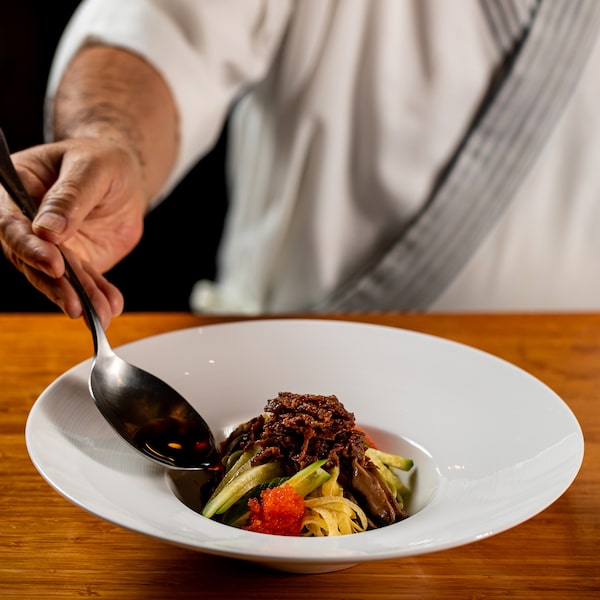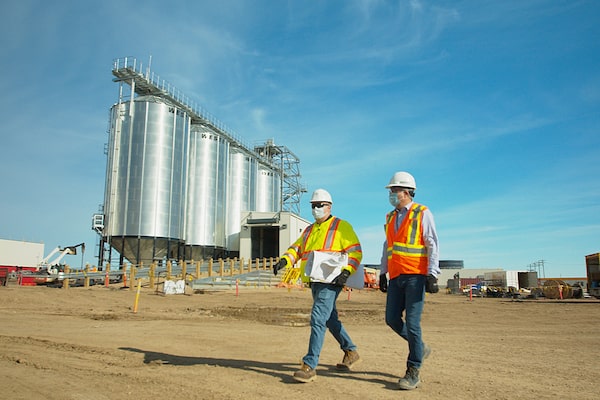
Global interest in foods made from alternative proteins—which are made from Canadian crops like peas, canola, oat and pulses—continues to grow, and French company Roquette has responded by building the largest pea protein plant in the world in Portage la Prairie, Man.Supplied by Those Canadians
Alcide Grenier, a fourth-generation farmer in southern Manitoba, grew peas for the first time in 2020. Prior to this, he typically grew cereals and oil seeds such as rye, red spring wheat, barley, canola and soybeans, but he got into yellow peas thanks to Roquette. The France-based food company is a global leader in plant-based ingredients and a pioneer of plant proteins, and it operates the world’s largest pea protein plant in Portage la Prairie, Man.
“It opens the door for us with new opportunities and growing consumer demand for plant-based protein, which I think will be the next big thing in agriculture,” Grenier says. “Roquette’s investment in my area means that as a producer, I will have long-term financial and agronomic stability.”
Grenier is one of the many Canadians benefiting from the alternative-protein industry, or food generated from non-animal sources such as plants, cells or fermentation. Examples of popular forms include oat milk and plant-based burgers, leading the charge to significant growth in recent years.
The rate of innovation and growth is so fast-paced in alternative proteins. The Canadian innovation community gets a real boost by accessing the experience, market intel and human and financial resources that these companies bring to the table.
— Shelley King, CEO of Natural Products Canada
According to a 2019 report from McKinsey, consumer interest in alternative proteins has been accelerating for about a decade, driven largely by health and environmental concerns and interest in animal welfare, with health being a particularly important factor. (An earlier McKinsey study found that consumer views on protein are shifting—82% of U.S. respondents said they thought plant proteins were healthy, only 74% thought the same about animal proteins.) A recent Canadian study estimates that, by 2035, one in 10 servings of protein will be derived from sources like plants, algae, fermentation or cellular agriculture. And some people are even more optimistic; the study found that 27 per cent of Canadians believe that by 2030, most people will get their protein from equal parts animal-based and alternative-based sources.
Canada is an ideal place to support consumer demand as it produces much of the raw material that fuels the industry. Foods and ingredients to make alternative proteins come from crops grown in Canada, including pea, canola, oat and pulses. A report from Ernst and Young, commissioned by Protein Industries Canada, found that because of Canada’s strong agriculture scene, the country could meet approximately 10 per cent of the overall plant-based foods market, including alternatives to dairy, eggs and seafood, in the near future. “Canada has the potential – and is well on our way – of being a global leader in plant-based ingredients and finished food products,” CEO of Protein Industries Canada Bill Greuel said. “By building on our strength as an agricultural powerhouse; with more than 28 M hectares of arable land and a leading producer of high-protein crops such as peas and canola, we have opportunity to turn this global demand into a long-term, sustainable economic driver for Canada.”

Vancouver-based Wamame Foods, which makes a wagyu beef alternative called Waygu, benefits from being based in Canada, where the company has access to raw materials, cutting-edge research and its predecessors, including Daiya, Gardein and Yves Veggie Cuisine.Wamame Foods
“Looking forward is one of the values of Roquette, and when I meet government officials, they are really looking for what’s good for Manitoba and what’s good for Canada,” says Dominique Baumann, managing director at the company. “And plant-based protein is really a great opportunity for Manitoba and Canada.”
Canada has already seen great innovation in the alternative-proteins sector. Shelley King, CEO of Natural Products Canada, says that when international companies set up shop here, they don’t just bring jobs—they bring new ideas and expertise that accelerate the whole ecosystem. “This is especially true in alternative proteins, where the rate of innovation and growth is so fast-paced,” King says. “The Canadian innovation community gets a real boost by accessing the experience, market intel and human and financial resources that these companies bring to the table.”
Blair Bullus agrees. The founder and president of Vancouver-based Wamame Foods, which produces Waygu, a plant-based alternative to Wagyu beef, says being located in Canada is a key factor in his company’s success. “Only in Canada would we be able to execute on this vison by having access to the most innovative raw materials and cutting-edge research, such as our partnership with the University of British Columbia. In addition, talent fostered by a legacy of successful industry leaders, such as Daiya, Gardein and Yves Veggie Cuisine, have provided a platform from which to develop products that can truly challenge the status quo.”
What’s more, alternative proteins are touted as a way to help reduce world hunger and food insecurity that will inevitably increase as a result of environmental impacts, such as longer drought seasons, less predictable rainfall, and crop destruction due to climate change. As the global population grows, alternatives to meat are easier and often more cost effective to produce and transport.
These more sustainable foods can help alleviate the global impact of animal-based agricultural practices as meat production is a huge contributor to carbon emissions.

According to Dominique Baumann, managing director of French specialty food company Roquette, “plant-based protein is really a great opportunity for Manitoba and Canada."SUPPLIED BY THOSE CANADIANS
“We know that alternative proteins in comparison to animal-based proteins require substantially less resources,” Bullus says. “For example, studies by the Good Food Institute show that the highest yield plant-based proteins require just 1 per cent of the water and land to cultivate in comparison to beef and they produce just one tenth of greenhouse gases.”
Of course, Bullus acknowledges, people need to actually enjoy alternative protein products and choose them over animal-based products on a large scale to make a noticeable environmental impact, which is why Wamame invests so much time, attention and money on developing products that chefs, businesses and regular consumers want to use.
Like Wamame, Roquette is an example of how foreign investment can pave the way for made-in-Canada green technologies and expertise to be exported globally as part of the fight against climate change.
That’s why Grenier is optimistic that the foreign direct investment in Canada’s alternative protein sector means he — and many other farmers in the country — will be able to continue farming and supporting the evolving landscape. “Hopefully, what the future holds for me as a grower is an ability to continue to do what I love, put food on the table for my family, and keep the family farm going and profitable,” he says.
“Because the thing is, the industry’s always changing, and it’s important to have new markets like this.”
Advertising feature produced by Globe Content Studio with Invest in Canada. The Globe’s editorial department was not involved.